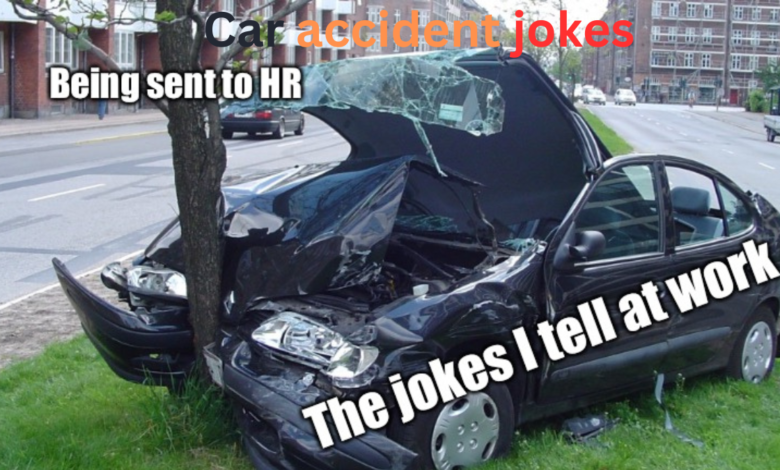Car Accident Jokes: The Fine Line Between Humor and Sensitivity

When it comes to humor, boundaries can car accident jokes often be delicate, especially regarding topics like car accidents. Jokes about such serious subjects tread a fine line between being entertaining and being insensitive. As we delve into the world of car accident jokes, it’s essential to navigate this terrain with a keen sense of context, audience, and empathy. This guide explores the nuances of humor related to car accidents, offering insights into why such jokes exist, the potential impact they have, and how to approach this type of humor thoughtfully.
The Genesis of Car Accident Jokes
Car accident jokes have a long-standing presence in comedy, often rooted in the tradition of finding humor in everyday misfortunes. These jokes typically arise from the human tendency to use laughter as a coping mechanism for dealing with discomfort or fear. They capitalize on the absurdity or unexpected nature of accidents, turning potentially distressing scenarios into comedic material.
The origins of these car accident jokes can be traced back to a broader comedic tradition where misfortune is a common subject. From slapstick comedy in silent films to modern-day stand-up routines, humor about accidents often reflects a universal struggle to find light in difficult situations. The idea is that by laughing at these scenarios, we can somewhat alleviate the anxiety they provoke.
It’s important to note that the context in which these car accident jokes are told can significantly impact their reception. In a setting where everyone is comfortable and understands the intention behind the humor, these jokes might be received more positively. However, in other contexts, they can easily cross the line into insensitivity.
Understanding the Impact of Car Accident Jokes
Humor about car accident jokes can elicit a range of reactions, from hearty laughter to discomfort and offense. The impact of these jokes largely depends on the audience’s personal experiences, cultural background, and the nature of the joke itself.
Empathy and Sensitivity
Empathy plays a crucial role when it comes to humor about sensitive topics. People who have experienced car accidents or have loved ones who have may find such jokes distressing or hurtful. Even if the intention is not to offend, the impact can still be significant. Sensitivity is key, and understanding the boundaries of your audience is essential when making or sharing these jokes.
The Role of Humor in Coping
For some, humor about car accident jokes can serve as a coping mechanism. Laughing at what could otherwise be a distressing topic can help people deal with their fears or anxieties about driving and accidents. In such cases, these jokes can offer a form of relief, making it easier to discuss and confront these concerns.
However, this does not mean that all car accident jokes are appropriate. The context in which they are shared, the audience’s state of mind, and the way the humor is framed all contribute to whether the joke is helpful or harmful. Understanding this balance is crucial for responsible humor.
The Fine Line Between Humor and Insensitivity
The line between humor and insensitivity is often thin and blurred. Jokes that make light of serious situations can be seen as trivializing the experiences of those affected. For example, a joke about a severe accident might seem callous or disrespectful to someone who has been involved in a similar incident.
It’s also important to consider the setting. While a joke might be acceptable among friends who share a similar sense of humor, it might not be suitable in a public or professional setting. Being mindful of the audience and the context can help ensure that humor about car accidents does not come across as offensive or inappropriate.
Types of Car Accident Jokes and Their Reception
Car accident jokes come in various forms, each with a different impact. Understanding these types can help navigate the complex terrain of humor related to accidents.
Slapstick Humor
Slapstick humor often involves exaggerated physical comedy and absurd situations. In the context of car accidents, this might include jokes about cartoonish accidents or absurdly unrealistic scenarios. This type of humor usually aims to entertain rather than offend, relying on over-the-top scenarios that are fictional.
For example, a joke about a car driving off a cliff only to bounce back up and continue driving might fall into this category. It’s designed to be so far-fetched that it’s not a reflection of real-life accidents. Such jokes are often more acceptable because they do not directly reference real-life suffering.
Self-Deprecating Humor
Self-deprecating humor involves making jokes at one’s own expense. When applied to car accidents, this might involve someone joking about their minor mishaps or clumsiness while driving. This type of humor is often used to diffuse awkwardness or share a laugh about a personal experience.
For instance, a driver might joke about their tendency to get lost or their frequent minor fender-benders. This type of humor is generally more accepted because it’s personal and does not involve making light of others’ suffering.
Dark Humor
Dark humor refers to jokes about serious, often grim topics, including car accidents. These jokes can be polarizing, as they tread into the territory of making light of situations that are typically viewed as tragic. Dark humor relies on a certain level of shock value and can be seen as provocative or offensive, depending on the audience.
An example of dark humor might be a joke that combines car accidents with other serious themes, aiming to elicit a reaction through discomfort. While some might find this type of humor intriguing or thought-provoking, others might view it as in poor taste.
Puns and Wordplay
Puns and wordplay involve playing with the meanings of words to create humor. In the context of car accidents, this might involve clever or witty remarks that play on driving terminology or car-related situations.
For instance, a joke might involve a play on the word “crash,” such as “I’m always crashing parties, but my car has never crashed a party!” This type of humor is generally light-hearted and tends to be less controversial than other forms.
Navigating Humor in Different Settings
The appropriateness of car accident jokes can vary greatly depending on the setting. Understanding where and when to use this type of humor is essential for ensuring it’s received in the intended spirit.
Social Gatherings
In informal social settings, car accident jokes might be more acceptable, especially among friends who share a similar sense of humor. It’s crucial to gauge the mood and comfort level of the group before making such jokes. If everyone is relaxed and receptive to this type of humor, it might be well-received.
Professional Environments
In professional settings, humor related to car accidents is generally best avoided. Workplace environments typically require a higher level of sensitivity and professionalism. Jokes about accidents can be perceived as unprofessional or insensitive, particularly if there are colleagues who have personal experiences related to the topic.
Public Spaces
In public spaces, including social media, the reach and diversity of the audience mean that car accident jokes can easily offend. What might be acceptable in a private conversation could be taken the wrong way when shared publicly. Being mindful of the broader audience and avoiding potentially offensive jokes is crucial.
Balancing Humor and Sensitivity
Finding the right balance between humor and sensitivity involves understanding the potential impact of your jokes and adjusting accordingly. Here are some guidelines to help maintain this balance:
Know Your Audience
Understanding the audience’s background and experiences is key to determining whether a car accident joke will be well-received. If you’re unsure, it’s often best to err on the side of caution. Consider whether the joke could be hurtful or offensive to anyone present.
Consider the Context
The context in which a joke is told plays a significant role in how it’s received. Jokes that might be appropriate in a private setting among friends might not be suitable for a public forum or professional environment. Adjust your humor to fit the context and ensure it aligns with the expectations of the setting.
Be Mindful of the Timing
Timing is an essential factor in humor. Jokes about car accidents might be more acceptable if they are told after a relevant experience or in a context where everyone is comfortable with the topic. Avoid making jokes about sensitive subjects immediately after an accident or in situations where they could be perceived as insensitive.
The Role of Humor in Coping with Accidents
Humor can play a valuable role in coping with the aftermath of a car accident. For some, it provides a way to deal with the stress and trauma associated with such experiences. When approached with care, humor can help people process their emotions and regain a sense of normalcy.
Using Humor as a Coping Mechanism
For those directly involved in an accident, humor can serve as a coping mechanism to alleviate stress and anxiety. Sharing light-hearted jokes about minor aspects of the experience might help individuals find some relief and normalize their feelings.
Connecting with Others
Humor can also facilitate connection and understanding between individuals who have experienced similar situations. Jokes shared among those who have been through similar experiences can create a sense of camaraderie and support. It’s important, however, to be respectful and considerate of each person’s unique experience.
Avoiding Desensitization
While humor can be beneficial, it’s essential to avoid desensitization to the seriousness of car accidents. Jokes should not undermine the gravity of real-life situations or diminish the impact of such experiences. Maintaining a balance between humor and respect is crucial for effective coping.
Conclusion
Car accident jokes occupy a complex and nuanced space in the world of humor. While they can offer a way to deal with anxiety or discomfort, they also require a careful approach to ensure they are not hurtful or insensitive. Understanding the various types of car accident jokes, their potential impact, and the appropriate contexts for sharing them is essential for navigating this delicate terrain.
Whether used as a coping mechanism or simply as a form of light-hearted humor, car accident jokes should always be approached with empathy and respect. By balancing humor with sensitivity, we can enjoy the lighter side of life while remaining mindful of the experiences and feelings of others.

